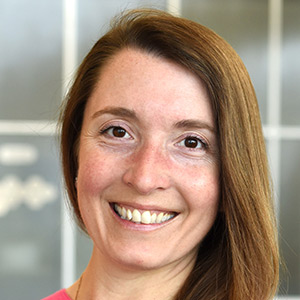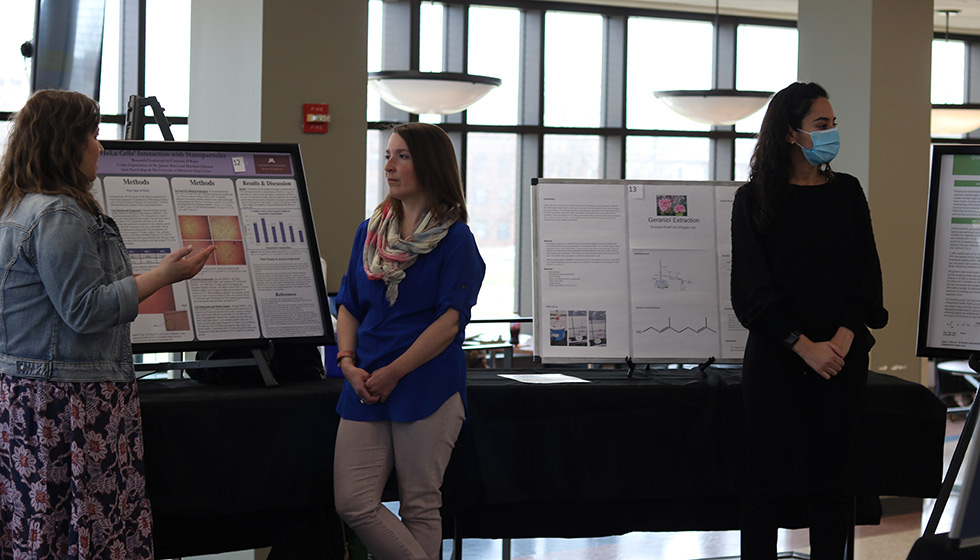Cancer is a frightening word that profoundly affects too many lives. Extensive research has been conducted worldwide for years, and while there have been some breakthroughs, we still have a long way to go in combating cancer. SPC alum Courtney O’Kane is deeply committed to this fight and believes the solution will require a strong combination of science, research, and proactive communication of new findings to the public.
For the first ten years of her professional life, Courtney worked as a buyer and merchandiser in the fashion industry. Then, in 2015, she was diagnosed with Crohn’s disease and decided to pursue education in nutrition and science to help address her personal health challenges. She took two years of prerequisites and discovered her true passion was in the hard sciences.

Courtney met Dr. Kristyn VanderWaal Mills at SPC through our Career and Academic Planning mentorship program (CAP-SH). Dr. VanderWaal suggested that Courtney pursue science through our Science and Engineering Technology Program, focusing on the critical field of nanotechnology. As part of that program, Courtney was encouraged to work as a Bio-Nano Laboratory Researcher at the Minnesota Nano Center on the University of Minnesota, Twin Cities campus. Courtney finished her science courses as a biology and chemistry tutor at Saint Paul College, receiving SPC’s Heart of College Award for her dedication to tutoring. Courtney presented her nanotechnology research at the SPC Science Showcase, which was highly received. She had the opportunity to present these findings at the 2022 Advanced Technical Education Principal Investigators Conference in Washington, DC, with Dr. VanderWaal Mills, Dr. Travis Mills, and two fellow SPC students.
At the University of Minnesota Nano Center, Courtney quickly found her passion as a scientist working with HeLa cells, a cancer cell line, nanoparticles, zinc oxide, and titanium dioxide. Nanoparticles are used in many everyday products, such as sunblock, toothpaste, bleached paper products, and electronics. Though they are very small (mostly under 100 nanometers, which is smaller than a particle of sand), these particles may be carcinogenic and need further research for their effects on the human body.
Soon after completing her work at the University of Minnesota Nano Center, Courtney submitted her manuscript “HeLa Cells’ Interaction with Nanoparticles Zinc Oxide and Titanium Dioxide” to The Stanford Undergraduate Research Journal (SURJ), hoping they would publish it. Only 4% of submitted articles are accepted for this prestigious journal. Courtney was shocked and excited to receive a letter saying her article had been accepted for publication in the SURJ Winter 2025 edition. Below is a portion of this letter:
Dear Courtney O’Kane,
Congratulations! I am pleased to inform you that we have decided to accept your submission, “HeLa Cells’ Interaction with Nanoparticles Zinc Oxide and Titanium Dioxide,” for publication in the Stanford Undergraduate Research Journal. Our reviewers were thoroughly impressed by the depth of your research and your writing skills.
Kind regards,
The Editors-in-Chief of the SURJ
Despite the long battle ahead of her in finding improvements that help lower the risk of people being diagnosed with cancer, Courtney sees hope for step-by-step improvements through the use of vaccines, such as those recently approved for preventing individuals from developing cervical (HPV) cancer. Beyond scientific research, Courtney firmly believes that society will need to work together to most effectively fight cancer, including more curiosity from the public to read articles that discuss the potential and evolving treatments for different types of cancers.
Courtney prepared this published article in collaboration with Dr. James Marti, Senior Scientist of the Bio-Nano Lab at the University of Minnesota Nano Center, her Bio-Nano Lab mentor, Matthew Johnson, and SPC Biology Professor, Dr. Kristyn VanderWaal Mills. Courtney is currently a Ph.D. student at the University of Minnesota Duluth Medical School in the Integrated Biosciences Program in the lab of Dr. Sabrina Scroggins. Courtney’s ultimate dream is to mentor young people through teaching and science communication and to further her research in cancer biology, immunology, and women’s health.
